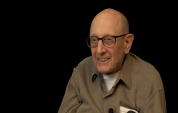2:50 | He repaired radios in the Marines, but Norman Kling was now an electrical engineer working at McDonnell Douglas. When he tried to get his Marine Reserve commander to recommend him for a commission, the answer caused him to leave the Reserve.
Keywords : Norman Kling Reserve commission McDonnell Douglas

Growing up in St. Louis, Norman Kling enjoyed walking around the town with his brother. On Sundays, they got dimes for the streetcar but they walked to the park because they had another idea about how to spend that money.
Norman Kling was working in a drug store at the soda fountain when a friend announced he was leaving to join the Marines. That got him thinking. He had a job lined up as a cutter in a dress factory but he didn't see himself spending a lifetime doing that.
It was to the west coast that Marine recruit Norman Kling was sent for boot camp. That would make him a "Hollywood Marine," to east coast recruits. He found the hard nosed methods of the drill instructors to be comical, in some cases.
After basic training, it was off to radio operators school. New Marine Norman Kling still had to drill while learning this job. When a sergeant from the Air Wing was put in charge of the detail one day, it soon became apparent that they didn't do a lot of drilling in the Air Wing. (Caution: coarse language.)
The radio shop at Camp Elliott was in a cramped space in a big warehouse building. They weren't allowed to expand but an enterprising tech sergeant scrounged some lumber and built a loft space. Norman Kling was staining the railing above when the company commander walked up just beneath him.
It was late in 1941 when Marine Norman Kling got his first furlough. He had a nice visit with his folks in St. Louis and it was at a bus station on the way back to San Diego that he heard some astounding news.
Marine Norman Kling was in sick bay when his unit shipped out to New Zealand. He wound up in the new 2nd Anti Tank Battalion headed for the same area. He was skeptical of the need for this type unit in the Pacific. He was also skeptical of the poker playing of the communications officer.
Once they got to the Pacific, it was apparent that the ill conceived anti-tank unit was not really needed in the islands. It was deactivated and radio repair specialist Norman Kling was folded back into the 2nd Marine Division. He kept their radios working until it was time to go home.
The trip over to Korea was just a trip on a troop ship. No big deal, but while Norman Kling was docked in Japan, a huge typhoon hit the harbor and ships were coming unmoored and banging into each other.
Radio technician Norman Kling came ashore in Korea, briefly looked over a battered city, and hit the road in a truck. He began following the front as it moved around the peninsula. He wasn't in a combat role but he did singe off his eyebrows at one point.
Returning Marine Norman Kling had his eye on college when he got home from the Pacific. He entered the electrical engineering program at Washington University in his home town of St. Louis. He had a soft spot for the Corps in his heart or maybe it was his head. Either way, he joined the Marine Corps Reserve.
Marine Corps reservist Norman Kling was activated for Korea and there was one thought uppermost in his mind. How long will this delay my college degree?